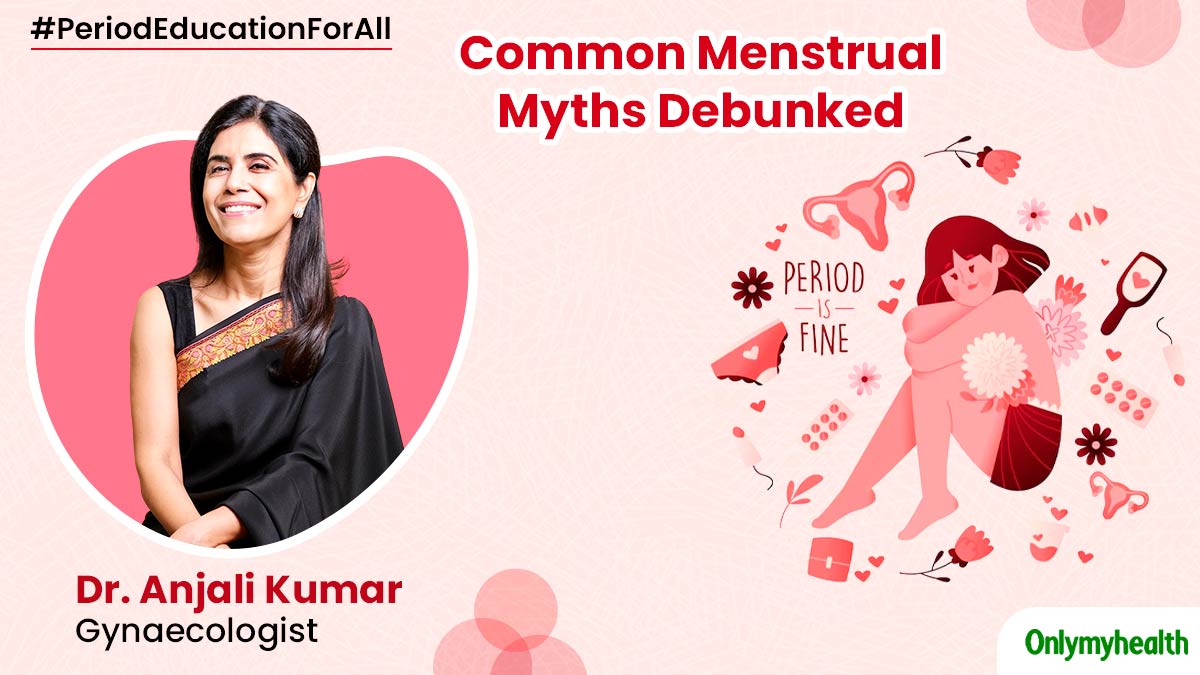
Menstruation is a natural phenomenon, but unfortunately, society has coerced us to view it differently. The lack of period talk and unawareness around menstrual hygiene has led to a series of menstrual myths and misconceptions. These in turn have governed people’s lives, especially the lives of young girls and women. Not only are these baseless, but they also give rise to gender-based discrimination and set limitations on the female population. As an extension to our #PeriodEducationForAll campaign, we at Only My Health, spoke to Dr Anjali Kumar (Maitriwoman for Instagrammers), Director-Obstetrics and Gynaecology, CK Birla Hospital, Gurugram, to bust some of the most common myths around period.
Table of Content:-
Also Read: #PeriodEducationForAll: Gynaecologist Anjali Kumar On Why Period Talk Is Also Necessary For Men
Common Period Myths Debunked

Myth: Period blood is unclean.
Fact: Menstruation is the periodic shedding of the endometrium, which is the inner lining of the uterus, Dr Kumar said. It is a normal process of the female reproductive system and there's nothing dirty or shameful about it, she added. During one's menstrual cycle, one's body is just getting rid of blood and tissues that are no longer needed.
Myth: Women shouldn't exercise during menstruation.
Fact: According to Dr Kumar, exercising during your periods is completely okay. “In case you’re feeling tired or have some cramp, you may modify your routine so that it is comfortable for you to exercise. So you can indulge in all exercises you feel at ease with,” she said.
Also Read: #PeriodEducationForAll: Dr Anjali Kumar Explains The Four Phases Of Menstrual Cycle
Myth: Women having periods should be secluded in a separate room.
Fact: Menstruation is not a communicable disease or contagious in any way. While social, cultural, and religious norms have barred women on period from participating in daily activities, science does not support any of these claims. Periods do not harm anyone!
Myth: Period sex cannot make you pregnant.
Fact: Having sexual intercourse can make you pregnant, irrespective of whether you are on or not on periods. As long as you have unprotected sex, you can definitely get pregnant.
Dr Kumar said, “Fortunately, a lot of things are changing, especially in metro cities. Women are coming forward, trying to overcome these misconceptions, and doing everything they can. In earlier times, people weren't allowed to cook, water the plants, touch food items in the kitchen, and were secluded in a room. But there has been a turn of events.”
Get Your Facts About Menstrual Hygiene Right!

In an interaction with us, Dr Kumar also shares important facts and hygiene tips around menstrual hygiene. These include:
- Menstrual hygiene has a direct relationship with reproductive health
- Ensure the use of good quality menstrual products, such as pad, tampons, and menstrual cups
- Frequent change of pads and tampons during heavy menstrual flow days
- Safely dispose pads and tampons in paper napkins
- Tampon users should never forget their tampons inside as it can lead to toxic shock syndrome
- Always wash your intimate areas from front to back
- There’s no need to remove pubic hair
- Vaginal washes, sprays, deodorants, intimate wipes are not needed
- Practise protective safe sex
Bottomline
To break period taboo, it is extremely important to talk and have conversations that in turn help debunk myths and misconceptions. Menstrual is a completely normal process which is a healthy part of our reproductive system. There is nothing dirty about it and one must work towards normalising period conversations and making menstrual hygiene education more accessible to everyone.
Also watch this video
How we keep this article up to date:
We work with experts and keep a close eye on the latest in health and wellness. Whenever there is a new research or helpful information, we update our articles with accurate and useful advice.
Current Version